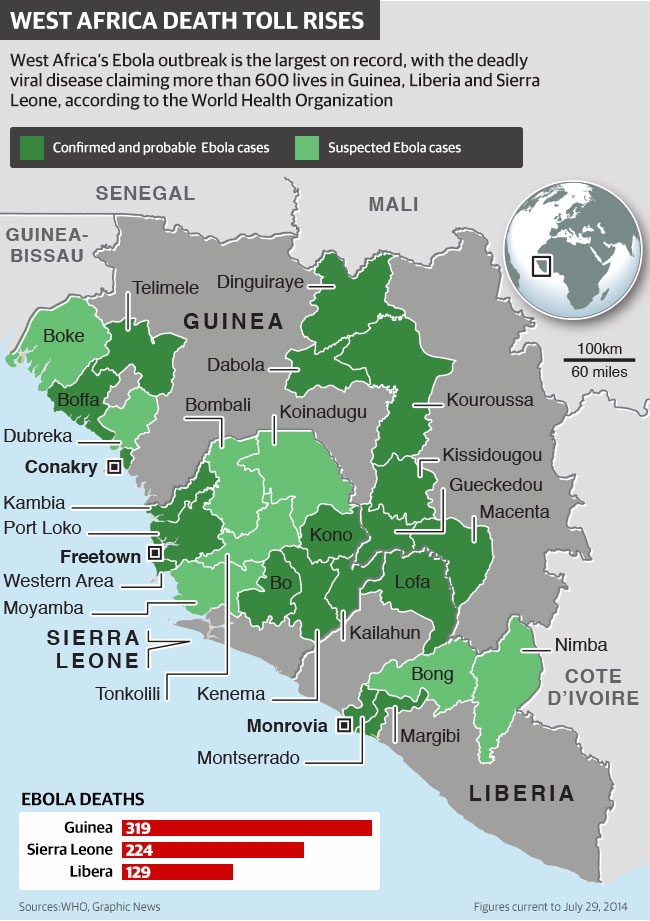
Doctor Benjamin Black, 32, a volunteer with Doctors Without Borders (MSF) in Sierra Leone, told the UK Telegraph that some of those in infected areas were not seeking medical treatment as they thought the disease was the work of sorcerers.
“There is a section of population here who simply don’t believe Ebola is real, they think it is witchcraft and so they don’t come to the treatment centres,” he told the UK Telegraph.
“Sometimes, even those who turn up at clinics with symptoms of the disease will be resistant to the idea that they have it. They will say ‘yes, people in my family have died already, but this is witchcraft rather than Ebola’.”
His alarming comments come after Doctors Without Borders warned that the outbreak is out of control and there are fears it “can only get worse”.
The medical charity said the crisis gripping Guinea, Liberia and Sierra Leone could spread to other continents and warns there is no overarching strategy to handle the world’s worst-ever outbreak of the disease.
Amid rising fears that the deadly virus could spread to the US, there are already plans to subject even healthy Americans into forced quarantine in the event of an Ebola pandemic.
Western doctors are now on the lookout for symptoms of the disease after the death of US citizen Patrick Sawyer, who travelled through a major transport hub in Nigeria. prompted fears that the disease could spread to the US.
Symptoms of the disease, which has anywhere from a 50 to 90 per cent mortality rate, include headache, fever, joint and muscle aches, weakness, diarrhea, vomiting, stomach pain, and lack of appetite.
There are now fears that the deadly and highly contagious virus will be passed on through air travel.
Florida congressman Alan Grayson has called on the Obama Government to impose a travel ban in response to the growing Ebola virus outbreak, the Huffington Post reports.
“This latest case is particularly troubling because Murtala Muhammed International Airport in Lagos is the third busiest airport in Africa, and it offers direct flights to the United States,” he wrote in a letter addressed to US Secretary of State John Kerry.
“I urge you to consider the enhanced danger Ebola now presents to the American public, and therefore request that appropriate travel restrictions be implemented immediately.”
Stephen Monroe, the deputy director of the National Centre for Emerging and Zoonotic Infectious Diseases, also warned of the dangers of air travel.
“It’s possible that someone could become infected with the Ebola virus in Africa and then get on a plane to the United States,” he said.
Describing the current crisis as “a rapidly changing situation”, Monroe pointed out that “people do travel between West Africa and the US” and health officials needed “to be prepared for the very remote possibility that one of those travellers could get Ebola and return to the US while sick.”

The death of Sawyer in the Nigerian capital of Lagos on Friday has prompted fears the disease could be on the brink of spreading to the West.
Mr Sawyer had worked for the Liberian government since 2008, returning every six months or so to his family in the Minneapolis suburbs.
An American doctor with Samaritan’s Purse, Kent Brantly, has come down with the disease and is in hospital in Liberia fighting for his life as is another American health volunteer, Nancy Writebol.

Two US Peace Corps volunteers in Liberia have been isolated and are under observation after being exposed to a person who later died of the deadly virus.
A spokeswoman said the volunteers will return to the US after they are cleared to travel.
In Hong Kong, a woman returning from Kenya was quarantined in Queen Elizabeth Hospital but tested negative, despite displaying Ebola-like symptoms.
There are similar fears in the UK, where a man was tested for Ebola in Birmingham after arriving back there from Nigeria via Paris.
Although the man was given the all-clear, the case has prompted fears that the deadly disease could spread to Britain.
Bart Janssens, MSF’s director of operations, warned that governments and global bodies had no “overarching view” or vision of how to tackle the outbreak.
“This epidemic is unprecedented, absolutely out of control and the situation can only get worse, because it is still spreading, above all in Liberia and Sierra Leone, in some very important hotspots,” he said.
“If the situation does not improve fairly quickly, there is a real risk of new countries being affected,” he told La Libre Belgique newspaper.
Despite the growing fears, the scientist who helped discover the Ebola virus said the outbreak in west Africa was unlikely to trigger a major epidemic outside the region, adding he would happily sit next to an infected person on a train.

But Professor Peter Piot told AFP that a “really bad” sense of panic and lack of trust in the authorities in west Africa had contributed to the world’s largest-ever outbreak.
Belgian scientist Piot, the director of the prestigious London School of Hygiene and Tropical Medicine, said even if someone carrying Ebola were to fly to Europe, the United States or another part of Africa, “I don’t think that will give rise to a major epidemic”.
“Spreading in the population here, I’m not that worried about it,” he told AFP.
“I wouldn’t be worried to sit next to someone with Ebola virus on the Tube as long as they don’t vomit on you or something. This is an infection that requires very close contact.
The International Civil Aviation Organisation (ICAO), however, isn’t taking any chances and has held talks with global health officials on potential measures to halt the spread of the disease.
ICAO secretary-general Raymond Benjamin said the virus crossing borders for the first time by plane could lead to new flight restrictions aimed at containing outbreaks and they will have to act quickly.
